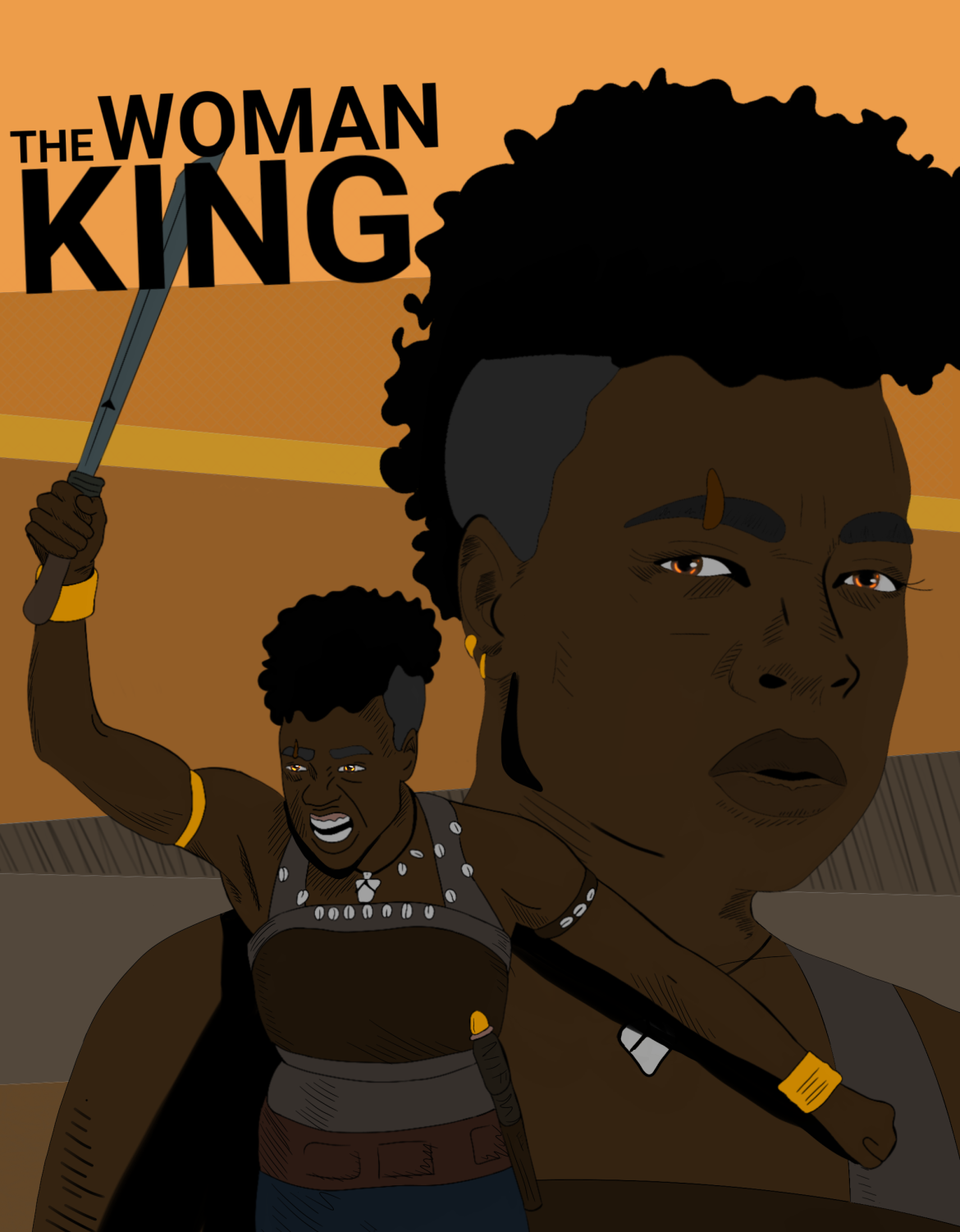“The Woman King” battles with its lost potential
October 2, 2022
2022 has become an increasingly exciting and optimistic year for film. With a multitude of original and innovative films doing well at the box office and seeing theater attendance finally climb closer to what it was prior to the pandemic. “The Woman King” is another film that has seen a large attendance in its first week, during a traditionally slow period.
“The Woman King” was directed by Gina Prince-Bythewood and stars Viola Davis, Thuso Mbedu, Lashana Lynch and John Boyega. The film is a historical epic set in 1800s Africa, following the Dahomey tribe and its elite all-female unit of warriors.
The film deals with the complicated issues of the African tribes selling people from other tribes to the European slave traders. Although the film is considered an “alternate history” take, where a lot of the history is not completely accurate, the film portrays the Dahomey tribe breaking away from the slave trade out of moral obligation by the end of the film. But this was not true in history, as the tribe continued to prosper from selling slaves until 1852.
Advertisement
Despite this, the film does make great strides in educating its audience in this subject, which is not often depicted in mainstream media. The complicated politics and moral issues are certainly developed, although slightly convenient in their resolution.
The film is also highly progressive in that it is a story about black women, with a dominantly black female cast, directed by a black woman. You don’t even see a single white actor until about an hour into the film. “The Woman King” is a big moment, as it is being positioned as a major release, with a sizable budget and is performing well at the box office despite not being part of an established franchise.
Although “The Woman King” can be viewed as a net positive for the industry going forward, it is not without its issues. The film has seen a large amount of controversy concerning the liberties it takes with its historical inaccuracies, as well as the fact it was written by two white women, but this is not to say that a large majority of similarly historically adjacent films don’t take similar liberties as well.
The film’s script is undoubtedly heavy handed, as it is host to plenty of melodramatic tropes and cheesy dialogue. The first half of the film, which is largely focused on the warriors themselves, felt genuinely enthralling. The second half becomes far more derivative, introducing a mostly unnecessary love interest for our main character, Nawi, as well as retreading ground that many historical dramas centered around the slave trade have covered.
When concerned with the Dahomey tribe directly, the film is at its strongest. Once it ventures further away from that, it starts to feel like a generic awards season film. A dramatic reveal later in the film, concerning our two leads, felt especially uninspired.
For a film that hinges on combat sequences, which emphasize these warriors’ ferocity and competence, they also fell a bit flat. It often uses the Hollywood standard “shaky-cam” which obscures a lot of the action and makes it hard to follow. The fight choreography also felt underwhelming, with fight sequences losing steam quickly and feeling stale.
The editing further emphasized these shortcomings, cutting far too often during scenes of high tension, taking power away from the action or performances. There are multiple moments with beautiful cinematography and composition that felt neutered by being cut away from prematurely.
Advertisement*
But this is not to say the film is bad, as some exceptional performances and direction choices shine through. Viola Davis further solidifies herself as a force to be reckoned with, showing absolute control and ferocity throughout the entire runtime. Her performance as Nanisca demands complete attention from the audience as well as her co-stars. She truly sells her position as “The Woman King,” with my audience cheering with glee once she claims her crown. Not many actors working today hold the same kind of screen presence.
Lashana Lynch also proves to be an exciting newcomer, with this being one of her only leading roles, following smaller turns in films like “No Time to Die” and “Captain Marvel.” Her screen presence is similarly captivating, with excellent chemistry with the cast and an infectiously charismatic attitude. The future seems bright for Lynch and hers will certainly be a compelling career to follow going forward.
Gina Prince-Bythewood also shows a strong sense of control in her direction, being a relatively seasoned director, having been directing features since 2000. The compositions are highly visually interesting, emphasizing the beauty and power of our main cast as well as the excellent set design. She clearly has a great shorthand with her crew and actors, as everyone feels fully confident in their roles.
“The Woman King” overall can feel a bit frustrating, as there are genuinely great aspects of it that make it feel like one of the great historical epics of our time. But its shortcomings are far too frequent and distracting to say that the film is completely enjoyable.
There is a conflict at the heart of “The Woman King” between something truly progressive and triumphant and the regressive missteps that similar films have fallen prey to, but the film undoubtedly still serves a step in the right direction.
Staff reporter Zaden Dennis can be reached at zdennis@dailyegyptian.com and you can find his other reviews at letterboxd.com/Zadenator.
To stay up to date with all your Southern Illinois news follow the Daily Egyptian on Facebook and Twitter.
Advertisement



